About Us
Advertise With Us
RSS Feed | Content Syndication
Terms & Conditions
Privacy Policy
Contact Us
BollywoodShaadis.com © 2026, Red Hot Web Gems (I) Pvt Ltd, All Rights Reserved.
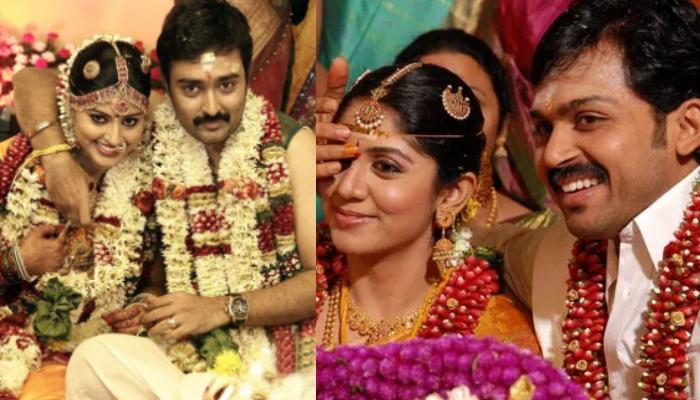
Tamilians are known for their simplicity and elegance even if it is something as big and extravagant as a wedding. They give huge importance to traditions and rituals, and that is exactly what makes their wedding so beautiful. From the colourful kanjeevaram sarees to the mogra-clad hair, everything in a Tamil wedding is a visual treat.
Also Read: Beautiful Significance Behind The 'Kanyadaan', The Most Emotional Moment For A Father And Daughter
Even though Tamil weddings are not very extravagant as compared to Northern communities like Punjabis, yet they are lavish when it comes to following traditions. Tamilians give a lot of priority to their rituals and traditions and the right manner in which the rituals should be performed. If you haven’t attended a South Indian wedding yet, here are the beautiful ceremonies and sacred rituals that take place in a Tamil wedding.
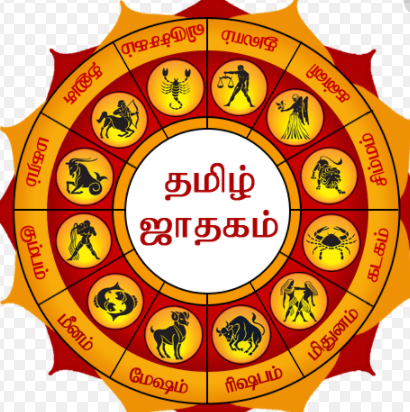
Nakshatra Porutham refers to matching of horoscopes, which plays a vital role in a Tamil wedding. Following certain Vedic guidelines, stars (according to the Tamil calendar) of the bride and groom are matched according to 12 points. Matching horoscopes plays an important role to decide the wedding date, muhurat and other rituals.

The wedding functions in a Tamil household begin with this ritual which is held a day before the wedding. In this, both the families offer their prayers to God for a peaceful, joyous and uninterrupted wedding.
Recommended Read: Parsi Wedding Rituals: In One Of The Rituals, The Bride And The Groom Throw Rice On Each Other
Continue reading below
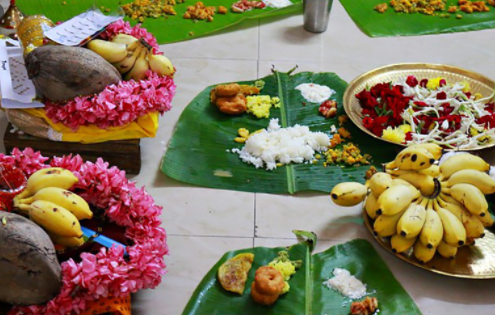
The term Sumangali refers to women, who are blessed with a harmonious and prosperous married life. In this ritual, a puja is conducted and prayers are offered to Sumangalis and the bride-to-be too seeks blessings for a blissful married life ahead. All Sumangalis are required to wear a traditional nine-yards saree or Madisar as it is traditionally called, for this puja. The number of Sumangalis invited for the Puja are always in odd numbers like 3, 5, 7 and 9. After the puja is concluded, Sumangalis are treated with an authentic South Indian feast served on a banana leaf.
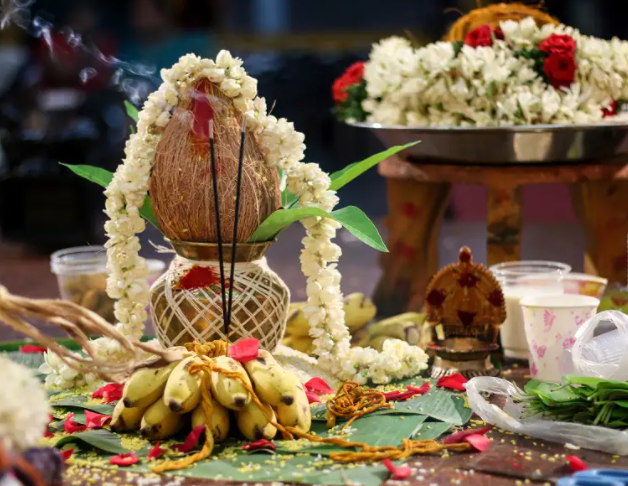
In this ceremony, nine types of grains along with curd are mixed and filled into 7 earthen pots decorated with sandalwood. These pots are later immersed in the water to feed the fishes. Since this ritual includes feeding the fishes, it is considered auspicious for the couple's journey ahead.
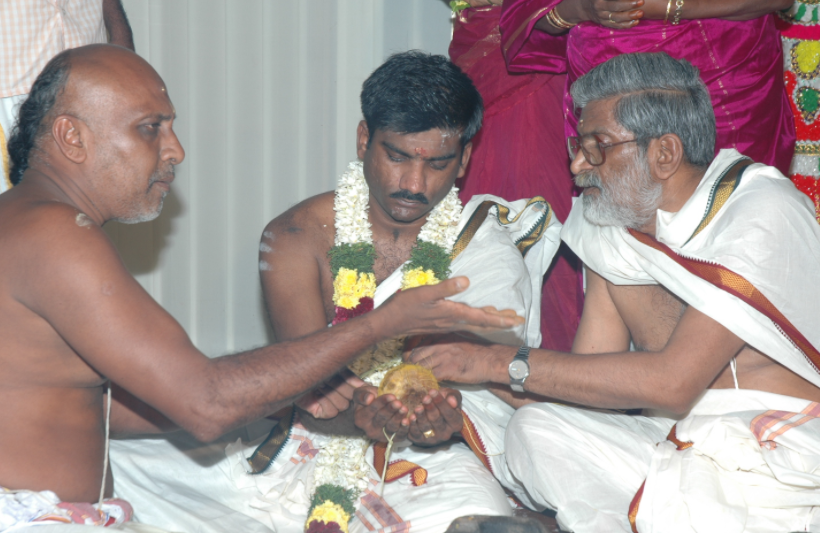
This ritual takes place at the groom's house on the early morning of the day before the wedding. This day marks his transition from a bachelor to a married man. In this ritual, the groom seeks permission for the same from his father and a yellow thread is tied around his wrist. A similar ritual takes place at the bride’s place and a yellow thread is tied to her wrist as well. The significance of this thread is to ward off evil energy.
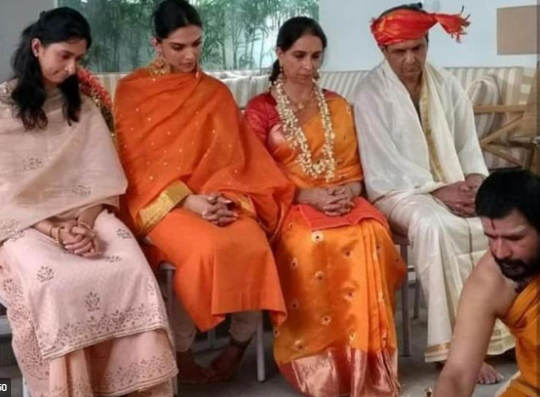
In this ritual, the bride and the groom's families pray to the souls of their ancestors. Ten Brahmins or less are invited for an authentic South Indian feast by both set of families. Fruits, coconut, flowers, paan supari, sweets and veshti angavastram (traditional clothes) are offered to the Brahmins and they are requested to bless the couple.
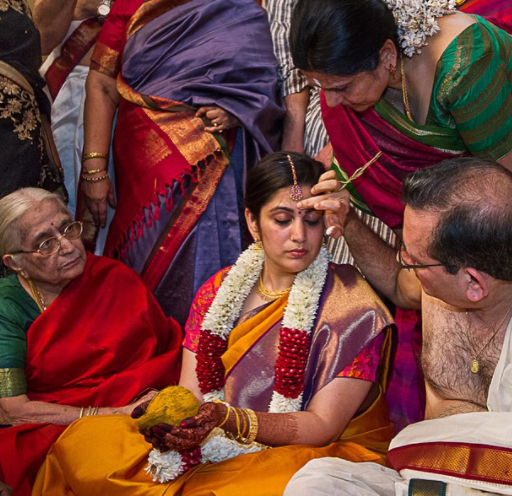
Nichayathartham is a formal engagement ceremony. It begins with a puja of lord Ganesha at the bride’s home. The groom’s family arrives at the bride’s house, gifts her a saree and jewellery and then apply sandalwood paste and vermillion on her forehead. The bride’s family performs similar ritual and gifts new clothes to the groom.
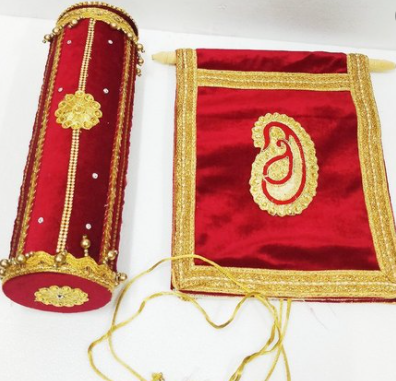
Lagna Pathirikai in Tamil translates to a wedding invitation. After the engagement ceremony, the wedding date is officially announced for the guests by the family priest. The Lagna Pathirikai contains details of the bride and the groom, their families, the marriage date and time. The Lagna Pathrikai is signed by the heads of the two families
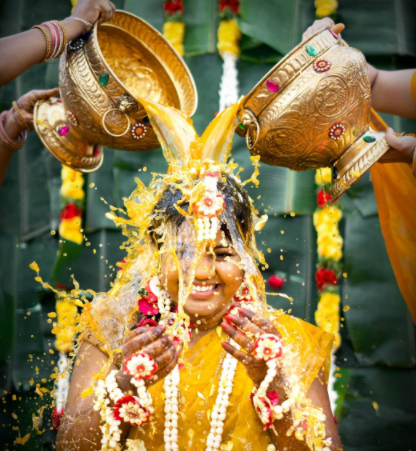
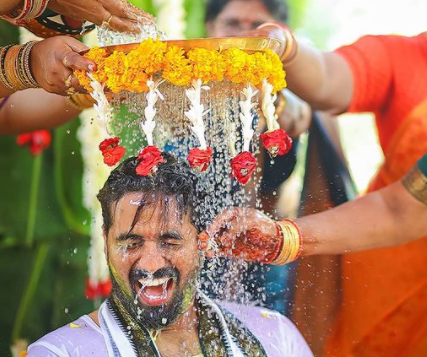
This ritual takes place on the dawn of the wedding day in the bride and groom's houses respectively. Haldi, kumkum and some oil is applied on the bride and the groom before they take a purifying bath and get ready for the wedding.
Recommended Read: The Reasons Why 'Chooda' And 'Kalire' Hold Auspicious Importance For A Punjabi Bride
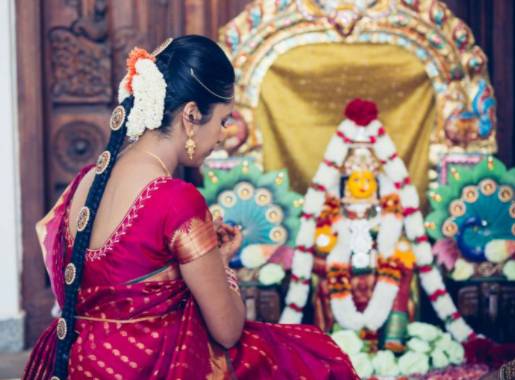
Amongst all the traditons and customs, this is one ritual which is only performed by the bride on her wedding day. Once the bride is ready, she offers prayers to Goddess Gauri, who is considered a symbol of purity.
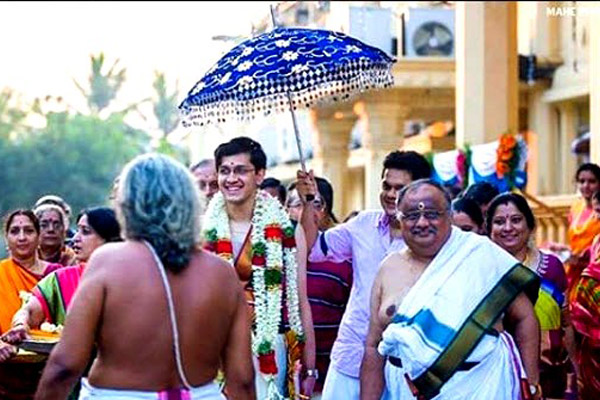
In this ritual, the groom pretends that he does not want to marry, and is going away a holy pilgrimage to Kashi. He is given a walking stick and a few bare essentials like an umbrella, slippers etc. for his journey. At this time, the bride’s father stops him and tries to persuade him towards married life, and offers to have his daughter married to him. The groom then agrees and is taken to the mandap.

As a part of this ritual, the bride’s mother washes groom’s feet with water, chandan and kumkum. After which the bride is called into the mandap. (In certain customs, it is the mother of the groom, who washes his feet).
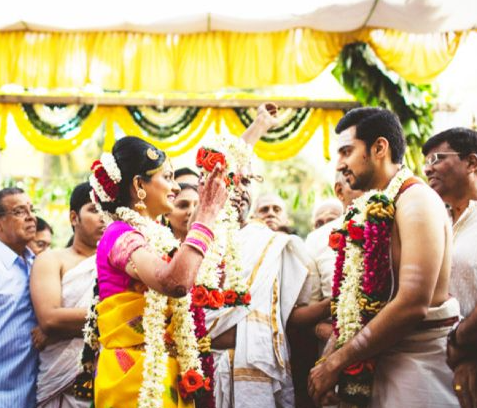
The bride is brought to the wedding mandap and the couple exchanges garlands. This is the first step to the wedding and is repeated three times to begin the holy union.
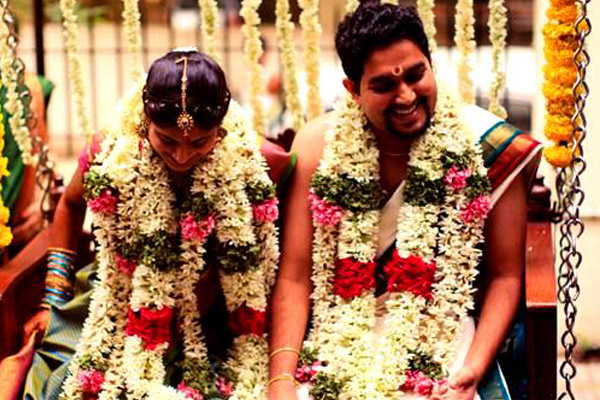
In this ritual, married ladies of the family offer some milk and banana to the bride and groom while they are seated on a swing. Rice balls are thrown around them as a symbol to ward off the evil.
Also Read: 'Vidaai' Song 'Meri Laado' From 'The Wedding Story' Will Make Every Bride-To-Be Cry Her Heart Out
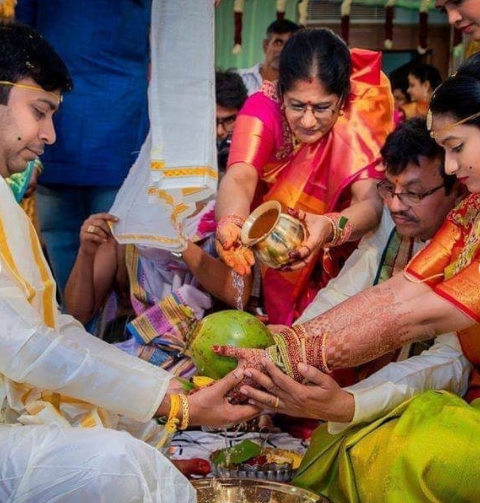

The bride and groom get off the swing. The end of the bride’s saree is tied to the groom’s angavastram. The groom is seated on the floor and the bride sits on her father’s lap, with a coconut in her hand. This ritual symbolises that a father is giving his baby daughter who played in his lap, and seeking the groom's promise that he will always take care of her. The bride’s father supports her hand and offers the coconut to the groom. The bride’s mother pours holy water on the coconut and through this formal ceremony, the bride’s parents give her to the groom and requests him to take care of her.
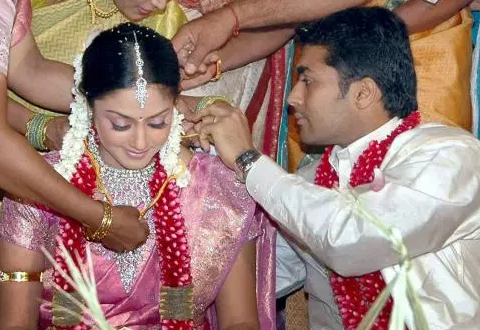
After the Kanyadanam, the groom’s parents present the bride a nine-yard silk saree. The groom then applies vermillion to her hair parting. The thaali (mangalsutra) is blessed by the priest and the groom ties it to the bride’s neck. The first two knots are tied by the groom and the third knot is tied by the groom’s sister.
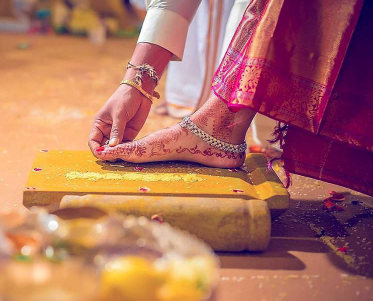
The bride and the groom take seven sacred rounds around the fire in this ritual known as the Saptapadi. There is also another ritual in which the groom holds the left toe of the bride and helps her to tread on a grindstone kept near the ritual fire. This symbolises their holy union, which will be as solid as a rock. This grindstone is compared to the entrance of her new home and everytime she steps out, it will remind her of her responsibilities towards her new family.
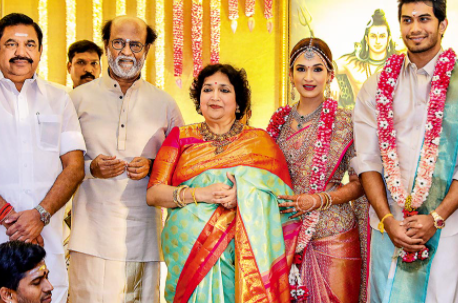
The wedding is followed by a formal get-together in the evening, where the newlyweds are seated on the stage and greet the guest. A lavish treat is spread for all the guests.
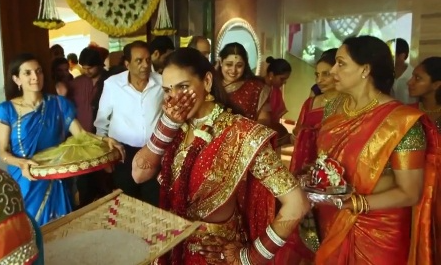
This is the first post-wedding ritual where both families give each other gifts as a token of love and appreciation. The bride then leaves her parental home and sets journey towards her new home with her husband.

This is the time when the bride and groom reach his house. The groom’s mother welcomes the couple by performing a small aarti. It is similar to the Grihapravesh rituals that happen in the North Indian wedding ceremonies.
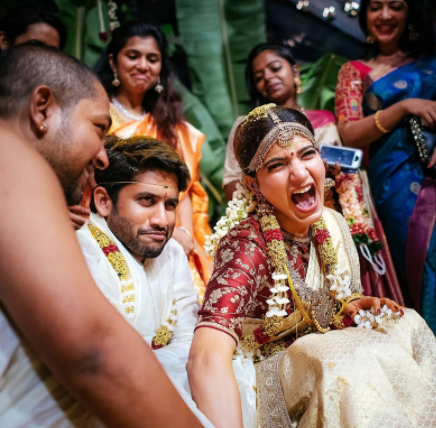
In this, the groom’s real sister gifts her sister-in-law a meaningful present and then the couple sits down to enjoy fun wedding games. In some communities, this ritual is also known as Nalanga and takes place right after the wedding. In earlier times, this ritual was considered as an ice-breaking session between the bride and the groom.
Recommended Read: Significance Of 'Saat Pheras' Or Seven Vows In A Hindu Marriage
These are the usual ceremonies that are part of the most Tamil weddings, however different Tamilian communities might also follow some different rituals and customs.
advertisement
advertisement
advertisement
